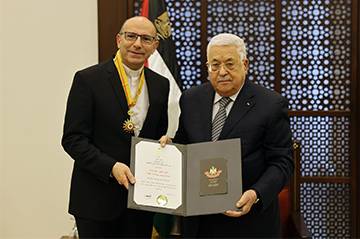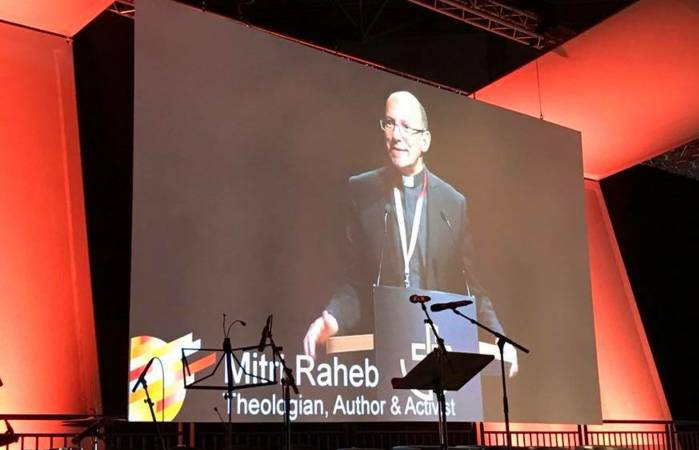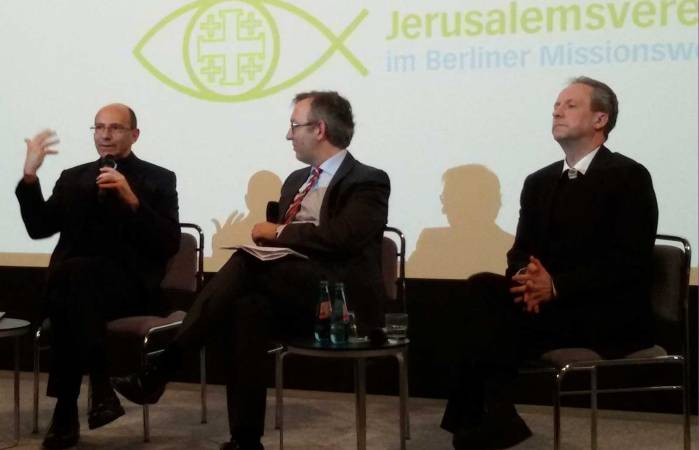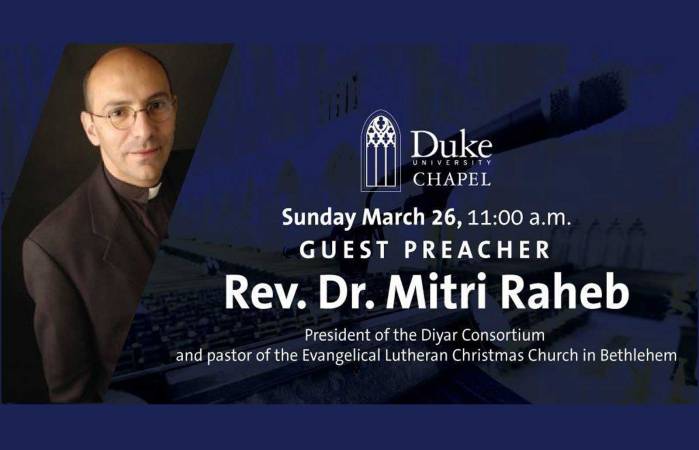Palestine, the Cross and the unexpected places
Palestine, the Cross and the unexpected places
Mathew 27, 45-54
When I cross the checkpoint from Bethlehem to Jerusalem, which looks more like a big prison with watchtowers, tripwires, cameras, turn stiles, metal detectors, and scanning machines, I frequently think that the checkpoint with all its sophisticated surveillance equipment is the manifestation of the empire controlling the flow of goods and peoples and subjugating them. More often than not there are long lines of weary folk waiting to walk through the checkpoint[i]. And there is only one line out of three existing lines which is ever operational. The other two are supposedly “out of order.” Behind a bullet proof window sits a young Israeli soldier, not even twenty five years old, with a machine gun. Outside people wait in lines for a long time, sometimes hours, while inside things crawl. In the lines are children trying to attend school; nurses who are late for their shifts; old people wishing to go to pray in Jerusalem (after obtaining a permit for one day, if they are fortunate), those seeking medical treatment if they have permission and the economic means to be treated outside the West Bank, etc. In mid-summer it is very hot, smelly and crowded. People slowly lose patience. They push left and right. Yet nothing moves. The young soldier may be in a bad mood or is texting his girlfriend. And then, suddenly in that cavernous hall, there arises the cry of an old Palestinian woman standing in her hand-embroidered dress, raising both hands toward the sky and imploring loudly in Arabic: "Wenak ya Allah?" meaning "Where are you, God?"
"God, Where are you?” is a three thousand year old lament which the inhabitants of Palestine have passed from one generation to the next while ending an occupation after the other. It is a question that echoes throughout the Bible. It is a question of a people whose faith is continually tested. They do not question the existence of God, nor His care, but they wonder why He is not moving. He sees His people being oppressed, He knows how they are being treated, and yet He seems to be so silent. The cry is supposed to shake Him so that he awakes, acts, and delivers.
Living under occupation and in war zone, seeing that which people work so hard to build and call home and their dreams repeatedly destroyed, being suffocated by the empire who is intent on being omnipresent and exercising its might, generates this old yet ever-new query, "God, Where are you?"
Yet throughout the Bible and with the exception of the Exodus, the God in whom the people of Palestine put their faith appears to be silent. He sees the Assyrians resettling His people and does nothing; He watches the Babylonians desecrate His temple, and He doesn't move an inch; His capital is destroyed by the Romans and He appears not to care. Even when His only beloved son is hung on the Cross, He is “absconditus” and hides[ii].
This has been the experience of the people of Palestine throughout history irrespective of their religious affiliation. When the Persians in 614 destroyed over three thousand churches in Palestine and little was left with the exception of the Church of the Nativity, God did nothing to push the invaders back; when the Crusaders plundered churches in the Holy Land, God did not move a finger; and when the Church of the Nativity was besieged in 2002[iii], neither God nor the so-called Christian world did anything.
The God in which the people of Palestine put their faith seems to be weak and not up to the challenge of the empire. Like His people He does not appear to have the means/resources to confront the empire. He is poor like His people, which is evident even in the architecture of Palestine. There are no monuments to commemorate His divinity such as the pyramids in Egypt, or decorated shrines in Mesopotamia, or beautiful buildings still visible in Iran, Turkey or Rome. And even when He has a dwelling, and although it is built by the sweat of his own poor people, most of the time such a place is constructed not so much for His name but to underline the glory of the empire. The Second Temple was built by a Persian decree and with Persian money[iv], the third by Roman consensus, the Dome of the Rock commissioned by an Arab caliph residing in Syria, and most of the churches of the Holy Land visited by pilgrims in the twenty first century were either built by the Byzantine Empire, Crusaders or by nineteenth century European powers. And so the old question still echoes today: "God, Where are You?"
God is worshiped in numerous countries and cultures. Ancient empires also had their own and impressive gods. It wasn't the notion that there is a God that was revelatory, but the response to that existential question “Where are you, God?” The people of Palestine were able to discover a unique answer to "God, Where are you?" And the response to it made history. God was visible and omnipresent in the empire where there were shrines and temples which represented not only His glory but that of the empire. The God of the empire was as omnipotent as the empire. Indeed, His power and that of the empire were almost interchangeable. He was a victorious God; a good match for a victorious empire.
At the other end of the spectrum there was the God of the people of Palestine whose tiny territory resembled a corridor in Middle Eastern geography. His country lacked resources. Palestine boasts no Nile or Euphrates. Without water its people have always been dependent on rainfall for their needs, is being located geographically where rain is scarce year-round. This God had to see His people repeatedly endure starvation, and migrate to neighboring countries for food and supplies. Above all, this God appeared to be weak compared with other gods. He seemed forever to be on the losing end, just like His people. This God was almost interchangeable with His people, His weakness was shown in theirs and their defeat was His. This God was a loser. He lost almost all wars and His people were forced to pay the price of those defeats. In short, God did not appear to be up to the challenge of the various empires. His people in Palestine were forced to hear the mocking voices of their neighbors who taunted, "Where is your God?"[v]
The revelation the people of Palestine received was the ability to spot God where no one else was able to see Him, and to find him in the most unexpected places. When His people were driven as slaves into Babylon, they witnessed Him accompanying them. When His capital, Jerusalem, was destroyed and His temple plundered, they saw Him there. When His people were defeated, He was also present. The salient feature of this God was that He didn’t run away when His people faced their destiny, but remained with them, showing solidarity and choosing to share their destiny. Consequently and ultimately, Jesus revealed this God on the Cross, in a situation of terrible agony, and pain, when He was brutally crushed by the empire and hung like a rebellious freedom fighter. The cross became the ultimate unexpected place for God’s revelation. The people of Palestine could then say with great certainty: "For we do not have a high priest who is unable to sympathize with our weaknesses, but we have one who has been tempted in every way, just as we".[vi]
For the people of Palestine this meant that defeat in the face of the empire was not an ultimate defeat.[vii] It meant that after the country was devastated by the Babylonians, when everything seemed to be lost, a new beginning was possible. Even when the dwelling place of God was destroyed, God survived that destruction; developing in response a dwelling that was indestructible. And when Jesus cried on the Cross, "My God, my God, why have you forsaken me?"[viii] that soul-rending plea was just the prelude to the Resurrection. The revelation made in Palestine was that God was to be found in unexpected places and where no one expected him. To Greeks this sounded like "foolishness," and even for Jews it was just a "stumbling block" but for Paul such a revelation was nothing less than "the power of God and the wisdom of God".[ix]
Is this simply a nice homiletical interpretation? No! This revelation was and is of utmost importance geopolitically. For it enabled the people of Palestine to survive all defeats. It made the defeat lose its teeth, death lose its sting, and empire lose its victory.[x] It ensured that empires were incapable of celebrating their victories, because while they crushed the people they occupied, they weren't able to crush their spirit.
This is precisely what the aforementioned revelation did for the people of Palestine. It helped them not to surrender after each defeat, but to pick themselves up and start over again. It made them develop an art of resilience to survive extremist empires, "hard pressed on every side, but not crushed; perplexed, but nothing despair; persecuted, but not abandoned; struck down, but not destroyed".[xi]
After the revelation of God at that ultimate unexpected place at the cross, there is no place on earth, in history, in your life or biography where God cannot reveal himself. He is there where we do not expect him, there when we do not count on him, there when hope seems lost forever. The good news proclaimed on the cross was and is: Expect God in the most unexpected places. He is here, for you and for us. Amen
[i] For eyewitness reports, see: www.eappi.org
[ii] Mark 15:34.
[iii] Mitri Raheb, Bethlehem besieged, pp. 27-34
[iv] Ezra 1:2
[v] Psalm 42: 3, 9 and 10
[vi] Hebrew 4: 15
[vii] Jacob Wrights argues that the literature of the Hebrew Bible underwent its most significant formulation in contexts of defeat and that the national identity of the people of Palestine was constructed in response to that. Jacob Wrights, The Commemoration of Defeat.
[viii] Mark 15: 34
[ix] 1 Corinthians 1: 24
[x] 1 Corinthians 15: 55
[xi] 2 Corinthians 4: 8-9



